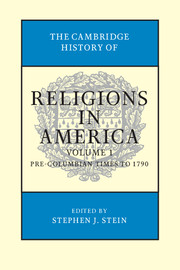Book contents
- Frontmatter
- Contents
- Contributors
- Editor's Introduction
- SECTION I BACKGROUND ON RELIGIOUS TRADITIONS – PRE-1500S
- SECTION II RELIGIONS IN THE POST-COLUMBIAN NEW WORLD – 1500–1680S
- SECTION III RELIGIOUS PATTERNS IN COLONIAL AMERICA – 1680S–1730S
- SECTION IV RELIGIOUS DIVERSITY IN BRITISH AMERICA – 1730S–1790
- SECTION V AMERICAN RELIGIONS IN THE EIGHTEENTH-CENTURY INTERNATIONAL CONTEXT
- 26 Religion and Imperial Conflict
- 27 Evangelical Awakenings in the Atlantic Community
- 28 Religion and the American Revolution
- 29 The Religious Landscape: From the Revolution to the New Nation
- 30 Religion in Canada, 1759–1815
- 31 From Religious Nationalism to Political Consciousness: The Bourbon Reforms in Spanish America, 1750–1790
- SECTION VI THEMATIC ESSAYS
- Index
- References
29 - The Religious Landscape: From the Revolution to the New Nation
from SECTION V - AMERICAN RELIGIONS IN THE EIGHTEENTH-CENTURY INTERNATIONAL CONTEXT
Published online by Cambridge University Press: 28 July 2012
- Frontmatter
- Contents
- Contributors
- Editor's Introduction
- SECTION I BACKGROUND ON RELIGIOUS TRADITIONS – PRE-1500S
- SECTION II RELIGIONS IN THE POST-COLUMBIAN NEW WORLD – 1500–1680S
- SECTION III RELIGIOUS PATTERNS IN COLONIAL AMERICA – 1680S–1730S
- SECTION IV RELIGIOUS DIVERSITY IN BRITISH AMERICA – 1730S–1790
- SECTION V AMERICAN RELIGIONS IN THE EIGHTEENTH-CENTURY INTERNATIONAL CONTEXT
- 26 Religion and Imperial Conflict
- 27 Evangelical Awakenings in the Atlantic Community
- 28 Religion and the American Revolution
- 29 The Religious Landscape: From the Revolution to the New Nation
- 30 Religion in Canada, 1759–1815
- 31 From Religious Nationalism to Political Consciousness: The Bourbon Reforms in Spanish America, 1750–1790
- SECTION VI THEMATIC ESSAYS
- Index
- References
Summary
During the War of Independence the American clergy fervently solicited divine support for their cause. Yet none was so bold to assert outright that God was on the side of the rebels. Although preachers discerned positive omens in such rare early triumphs as the battles of Trenton and Princeton, any claim to certain knowledge of God's will would have been condemned as blasphemous. Indeed, military setbacks, of which there were many during the early war years, were often perceived as heaven's retribution for the inhabitants' sins of arrogance, avarice, unchaste behavior, and similar vices. And so, in accordance with the understanding of that time, although pulpits throughout the land resounded with pleas for God's favor, the language was always cautiously supplicatory and conditional.
Both preachers and ordinary Americans shaped their case as an “appeal to heaven,” imploring God to recognize the righteousness of their cause. The battle flag of the Third Connecticut Regiment bore the motto, “AN APPEAL TO HEAVEN.” General George Washington, when awaiting the British attack at New York in 1776, had ordered a day of fasting and prayer by the troops to “incline the Lord, and Giver of Victory, to prosper our arms.” The next year he informed soldiers who had emerged victorious from a firefight at the battle of Brandywine that “another Appeal to Heaven with the blessing of providence, which it becomes every officer and soldier to supplicate,” might bring further success.
- Type
- Chapter
- Information
- The Cambridge History of Religions in America , pp. 588 - 609Publisher: Cambridge University PressPrint publication year: 2000



